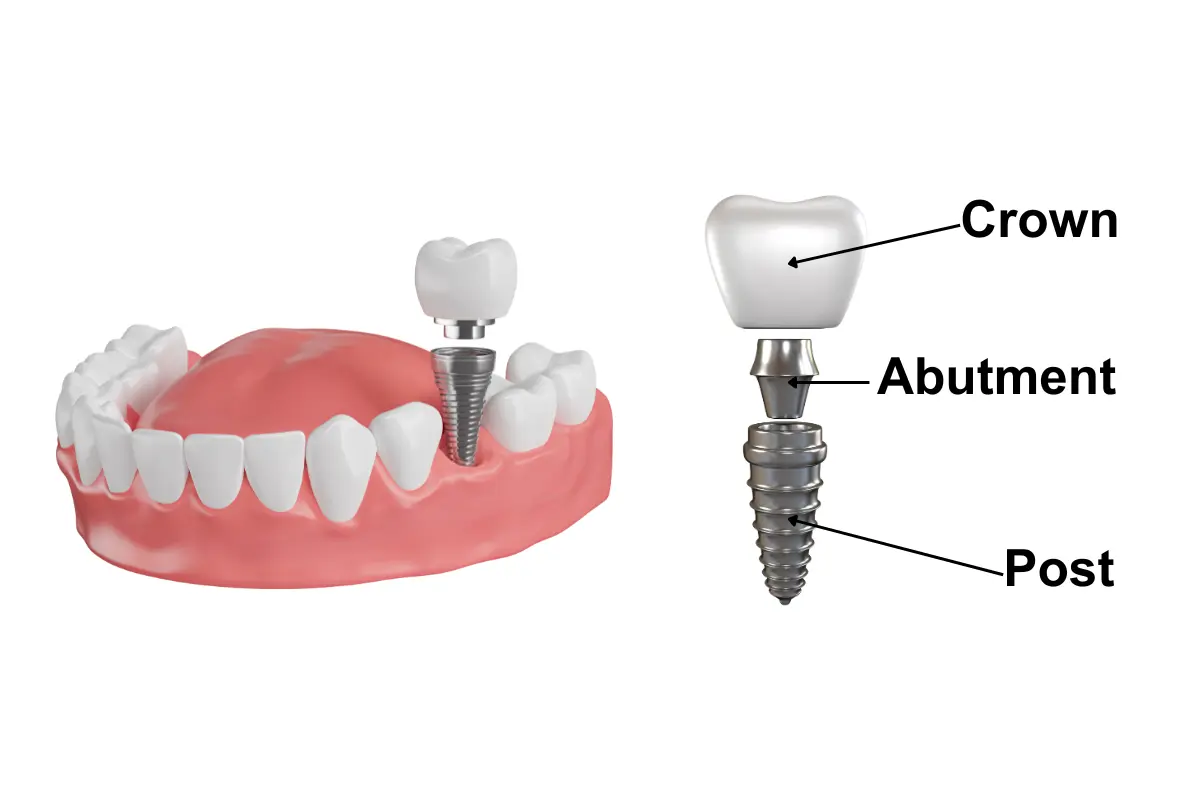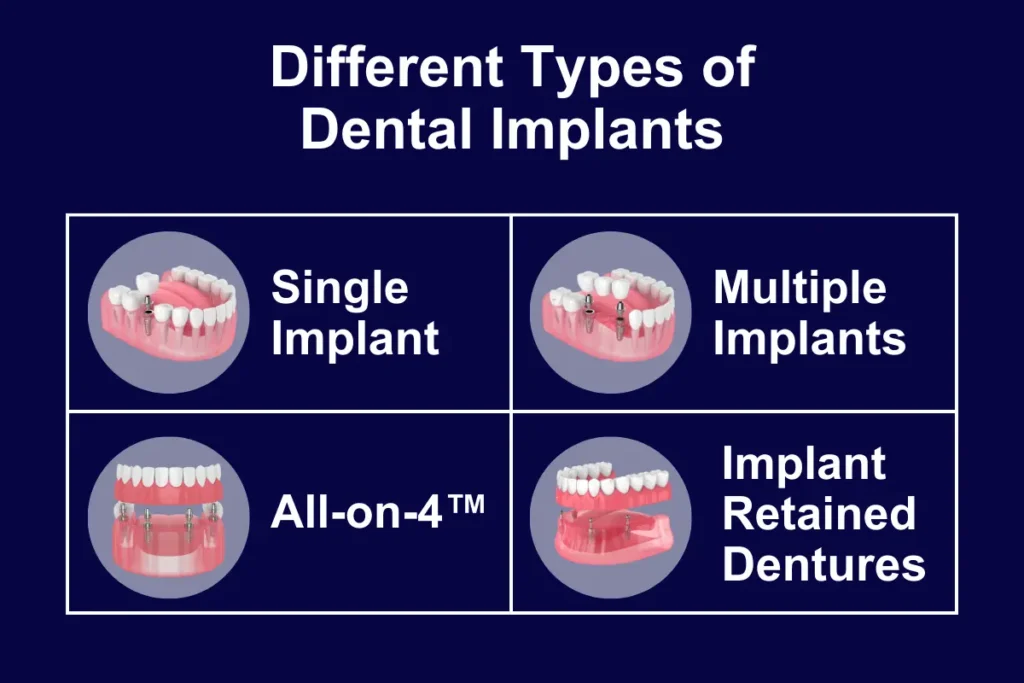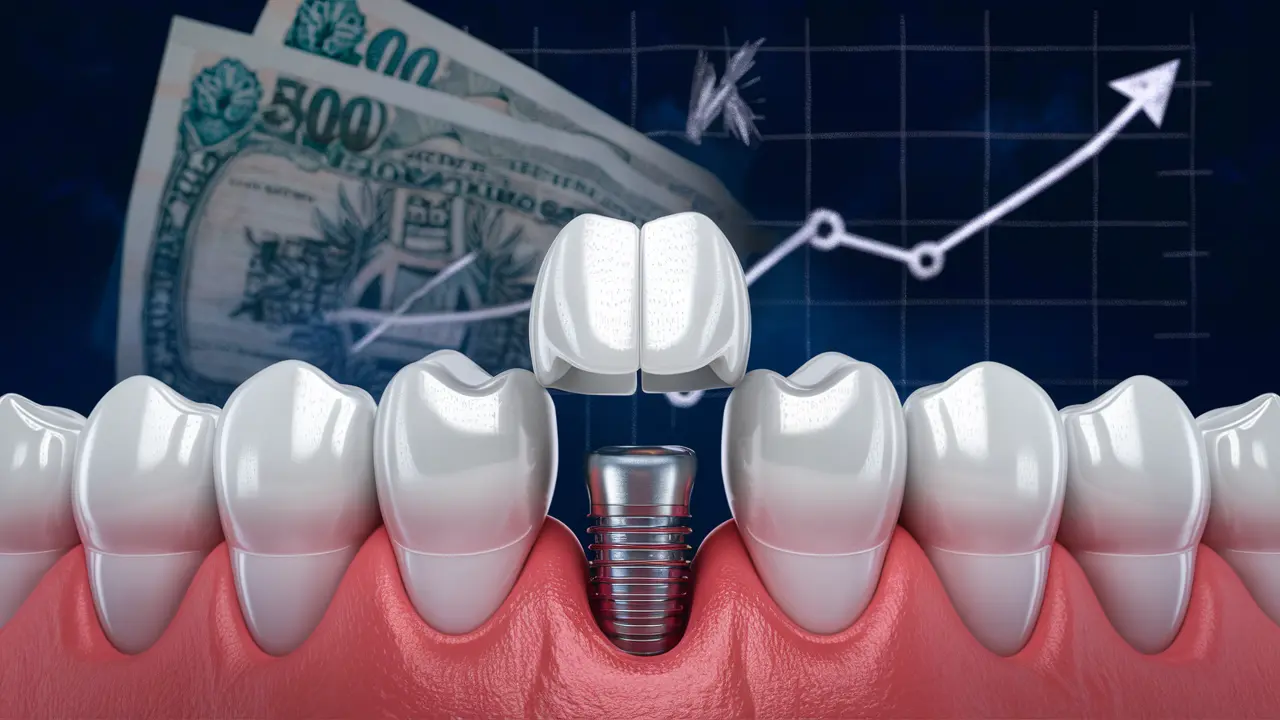In this Guide
Losing one or more teeth can affect your smile and confidence, on top of making previously routine daily activities, like eating, a chore.
Dental implants are designed to solve these issues and function like natural teeth, providing patients with a long-lasting solution and improving their overall quality of life.
They are regarded as the best choice for replacing missing teeth – compared to traditional options like dentures – because of their functionality and high success rate.
This guide covers everything you need to know if you’re considering dental implants, including the different types, costs, risks and alternative options.
Key Takeaways
- Dental implants offer a durable, natural solution for missing teeth
- Preferred over dentures for their long-term value and appearance
- They prevent bone loss by stimulating the jawbone
- Costs for a single implant vary between £2,000 to £3,000
- Most patients can have dental implants if they are healthy enough to have a standard tooth extraction
What is a Dental Implant?
Dental implants consist of three parts, a titanium post, the substitute for the tooth root, surgically placed into the jawbone, an abutment and a crown. Once the post fuses with your current jawbone, the abutment is connected to create the foundation for placing the crown.

The fusion of the titanium post with the jawbone is known as osseointegration. This process helps preserve your jawbone’s overall health by preventing further bone loss that typically happens when you lose a tooth and don’t replace it.
Dental implants can replace a single tooth, multiple teeth, or even an entire set of teeth, offering a long-term solution that can last a lifetime with proper care.
The Benefits
Choosing dental implants offers several key benefits:
- Natural Look and Feel: Implants match the appearance and function of your natural teeth.
- Durability: Implants can last a lifetime, making them a cost-effective, long-term solution.
- Bone Health Preservation: Implants stimulate and preserve the jawbone, preventing bone loss that often follows tooth loss.
- Improved Oral Health: Unlike bridges, implants do not require altering adjacent teeth.
- Enhanced Comfort and Confidence: Implants eliminate the discomfort and insecurity often associated with dentures, improving your quality of life.
- Convenience: Implants are maintained like teeth, typically all they require is regular brushing and flossing.
Considerations for Patients
The success of dental implant surgery has in the past been largely dependent on the patient’s current and past oral health.
Ideally, patients would typically have:
- Strong Oral Hygiene: A commitment to regular brushing and flossing
- Healthy Gums: No signs of periodontal disease
- Sufficient Bone Density: Enough jawbone to anchor the implant
- Non-Smokers: Smoking can interfere with the healing process
- Stable Health: No major conditions that impair healing
While the above is desirable and can help ensure the success of your dental implants it is no longer an absolute necessity.
We spoke to Dr. Zev Schulhof, Iconic Implants about his thoughts on how a patient’s oral health influences their suitability for implants.
He explained that with the advancements in dentistry and dental technology, almost everyone who has a tooth extracted can have it replaced with dental implants.
For a long time, a “good” candidate for dental implants has been considered to be a person who has sufficient bone structure and has good oral health (i.e. a non-smoker and healthy gums). However, technology and improved techniques have made dental implants far more accessible today.
Dr. Zev Schulhof, Iconic Implants
When Dental Implants Might Not Be Suitable
There are specific issues that won’t necessarily stop you from getting implants, but could impact the success/longevity of the treatment:
- Limited Jawbone: Insufficient bone mass can make implant support challenging, this generally happens when the tooth has been missing for a prolonged time
- Advanced Gum Disease: This can impact the success of the implant
- Smoking Habits: Smoking significantly hinders healing and implant integration
- Certain Health Conditions: Diseases like uncontrolled diabetes or autoimmune disorders may delay healing
- Pregnancy: Elective dental treatments are typically postponed during pregnancy
Problems with the jawbone and gums can often be resolved with extra treatments or by seeing a specialist.
For instance, a bone graft can help with jawbone issues, while a periodontist can address gum problems.
Different Types
There are primarily four common types of dental implant treatment, catering to different needs:

Single Implant
Ideal for one missing tooth, a single implant consists of a titanium post fixed into the jaw, topped with a custom crown. It looks and functions like a natural tooth.
Multiple Implants (Bridge)
For several missing teeth side by side, multiple implants support a bridge. This avoids affecting neighbouring teeth, offering a stable, long-lasting solution.
All-on-4
All-on-4 is for those missing most or all teeth in one arch. It uses four implants to support a full set of teeth, providing a fixed, permanent alternative to traditional dentures.
Implant Retained Dentures
This option uses a few implants to anchor a removable denture, enhancing stability and comfort. It minimises movement compared to standard dentures, making eating and speaking easier.
The Cost
Ok, now you know what a dental implant is, the different types and the benefits – but how much does the treatment cost?
A single dental implant can cost anywhere between £2,000 and £3,000. The price depends on several factors, including the number of implants required, missing adjacent teeth, the complexity of the procedure, and the materials used.
Unfortunately, there is no definitive answer or exact pricing for a dental implant in the UK, because it is a private cosmetic treatment. This means that dentists can freely set and change their pricing.
Another reason that causes the price to vary is that every patient has different requirements and overall dental health.
While one patient may require minimal prep work, another may require extensive bone grafts and other pre-surgery treatments to prepare them for their implant.
Dental Implants on the NHS
Dental implants are not available through the NHS, except in specific circumstances. The NHS only covers the costs for treatments essential for oral health and non-cosmetic procedures.
The exception is for individuals who cannot wear dentures or have lost teeth due to trauma, cancer treatment, or congenital conditions, where implants can be crucial for function and well-being.
The Procedure
Dental implant surgery involves several stages and multiple visits to your dentist, including:
- Initial Consultation: A thorough examination to assess your oral health and implant suitability.
- Treatment Planning: Tailoring a procedure plan that suits your specific needs.
- Implant Placement: Surgical insertion of the implant into the jawbone.
- Healing Process: Allowing time for osseointegration to occur.
- Abutment Placement: Fitting the connector post to the implant.
- Crown Attachment: Placing the custom-made crown onto the abutment.
The process from start to finish normally takes between 4-12 months, with around 3-5 visits to your dentist.
Potential Risks
Dental implant surgery, while generally safe, carries potential risks:
- Infection at the implant site
- Damage to surrounding teeth or blood vessels
- Nerve damage, causing pain or numbness
- Sinus issues, especially with implants in the upper jaw
Discussing these risks with your dentist is crucial for a full understanding before proceeding.
How to Avoid Complications
Managing the potential risks starts with a thorough evaluation by your dentist. This will allow them to discuss the procedure with you and ensure you’re a good candidate.
The evaluation includes assessing your oral health, bone density, and overall health status. Post-surgery, adhering to your dentist’s care instructions, attending regular dental check-ups, and maintaining good oral hygiene are crucial for reducing the risk of complications and ensuring the longevity of your implants.
Remember, if you start experiencing discomfort or problems with your implants, you must let your dentist know.
Aftercare
Proper aftercare is vital for the success and longevity of dental implants. Immediately following the procedure, adhere to your dentist’s advice on rest, medication, and diet.
Typically, you should:
- Avoid strenuous activity for a few days to reduce swelling and bleeding.
- Eat soft foods and gradually reintroduce harder foods as healing progresses.
- Follow prescribed pain management and antibiotic regimens to prevent discomfort and infection.
Daily Maintenance
Good oral hygiene is crucial for implant longevity. Treat your dental implants as you would natural teeth:
- Brush at least twice a day with a soft-bristle toothbrush and fluoride toothpaste.
- Floss daily using unwaxed tape or implant-specific floss to remove plaque and food particles.
- Consider using a water flosser or interdental brushes for thorough cleaning around implants.
Professional Maintenance
Regular dental and dental hygienist visits are essential for maintaining dental implants.
These visits will involve:
- Professional cleaning to remove plaque and tartar build-up, especially in hard-to-reach areas.
- Condition check of your implants, crowns, and the surrounding gum and bone.
- Full oral exam to spot potential issues, such as gum disease or implant loosening.
Combining diligent aftercare, daily hygiene practices, and regular professional check-ups will ensure your dental implants remain healthy and functional.
Alternative Treatments
As mentioned earlier, dental implants are typically the best option for replacing missing teeth.
But given their cost and the somewhat long treatment process, they aren’t a realistic option for everyone.
It’s worth remembering there are other available options, including:
Dentures
Dentures are a fast and cost-effective solution for replacing missing teeth. Standard dentures are removable, making them easy to clean, the downside is they might not offer the most secure fit.
This can result in many issues for the patient -primarily causing difficulty when speaking and eating, plus requiring several readjustments from your dentist.
Ultimately, they are typically better for those seeking a cheaper, non-invasive option.
Bridges
Bridges present a durable, less invasive middle ground between dentures and implants.
Bridges are crowns anchored to neighbouring teeth to fill gaps left by missing teeth. Similar to a dental implant, without the metal screw.
While they offer more permanence than dentures, they also require altering adjacent healthy teeth, which may be off-putting for anyone considering this option.
The Next Steps
Hopefully, you now have a reasonably good understanding of dental implants based on the information in this guide.
Are you still wondering whether a dental implant is the right option? It might be worth taking our dental implant suitability quiz.
The quiz is a series of simple yes or no health-related questions that explain whether you are a good candidate for implants.
Of course, the best person to evaluate your suitability is a dentist during an initial consultation. We can help you easily arrange this, all you need to do is complete our short consultation form and we’ll connect you with a local dentist.
FAQs
How Painful is Getting a Dental Implant?
Dental implants aren’t painful but some patients may experience more discomfort than others, but it’s manageable with anaesthesia during the procedure and pain relief afterwards.
How Long Does a Dental Implant Last?
Dental implants can last a lifetime, though the crown on top may need replacing every 10 to 15 years.
How Long Does it Take to Recover?
Recovery varies depending on the complexity of the procedure and individual healing.; initial healing usually takes about a week, but full integration with the jawbone takes 3 to 6 months.
How Long After Losing a Tooth Can You Get an Implant?
You can get an implant immediately after losing a tooth or wait several months, it depends on your oral health. Consultation with a dentist is key.




